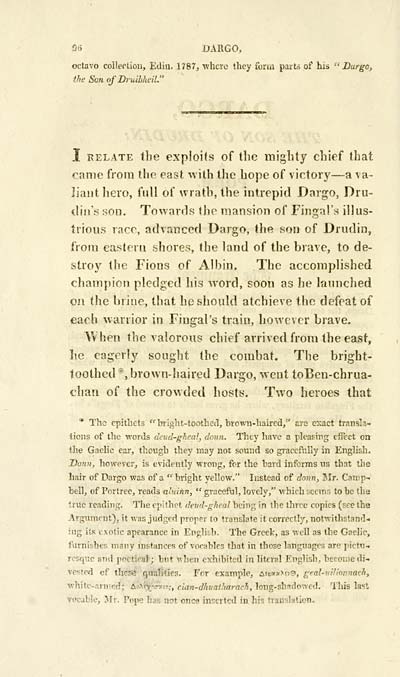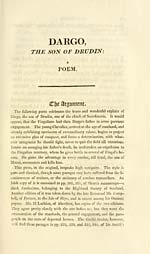Ossian Collection > Original collection of the poems of Ossian, Orrann, Ulin, and other bards, who flourished in the same age
(100)
Download files
Complete book:
Individual page:
Thumbnail gallery: Grid view | List view

9(> DARGO,
octavo collection, Ediu. 1787, where they wna parts of his " Dargo,
the Son of Druibheil."
I RELATE the exploits of tlie mighty chief that
came from the east with the hope of victory — a va-
liant hero, full of wrath, the intrepid Dargo, Dru-
(liiTs son. Towards the mansion of Fingal's illus-
trious race, advanced Dargo, the son of Drudin,
from eastern shores, the land of the brave, to de-
stroy the Fions of Albin. The accomplished
champion pledged his word, soon as he launched
on the brine, that he should atchieve the defeat of
each warrior in Fingal's train, however brave.
Vv hen the valorous chief arrived from the east,
he eagerly sought the combat. The bright-
toothed*, brown-haired Dargo, went toBen-chrua-
chan of the crowded hosts. Two heroes that
* The epithets " bright-toothed, brown-haired," are exact transIa-»
iions of the words deud-gheal, donn. They have a pleasing effect on
the Gaelic ear, though they may not sound so gracefully in English.
Dorvi, however, is evidently wrong, for the bard informs us that the
hair of Dargo was of a "bright yellow." Instead of donn, Jlr. Camp-
bell, of Portree, reads a'uinn, " graceful, lovely," which seems to be the
true reading. Tlie epithet deud-gheal being in the throe copies (see the
Argument), it was judged proppr to translate it correctly, notwithstand-
ing its exotic apearancc in Englith. The Greek, as well as the Gaelic,
furnishes many instances of vocables that in those languages are pictu-
resque and pocticai; but when exhibited in literal English, become di-
vested of thes^ gtfalities. For example, hwAxynB, geal-vilionnach,
white-armed; AoX^-irid!),-, cian-dhuaiharach, long-shndowed. This last
vocable, Mr, Pope has not once inserted in his translation.
octavo collection, Ediu. 1787, where they wna parts of his " Dargo,
the Son of Druibheil."
I RELATE the exploits of tlie mighty chief that
came from the east with the hope of victory — a va-
liant hero, full of wrath, the intrepid Dargo, Dru-
(liiTs son. Towards the mansion of Fingal's illus-
trious race, advanced Dargo, the son of Drudin,
from eastern shores, the land of the brave, to de-
stroy the Fions of Albin. The accomplished
champion pledged his word, soon as he launched
on the brine, that he should atchieve the defeat of
each warrior in Fingal's train, however brave.
Vv hen the valorous chief arrived from the east,
he eagerly sought the combat. The bright-
toothed*, brown-haired Dargo, went toBen-chrua-
chan of the crowded hosts. Two heroes that
* The epithets " bright-toothed, brown-haired," are exact transIa-»
iions of the words deud-gheal, donn. They have a pleasing effect on
the Gaelic ear, though they may not sound so gracefully in English.
Dorvi, however, is evidently wrong, for the bard informs us that the
hair of Dargo was of a "bright yellow." Instead of donn, Jlr. Camp-
bell, of Portree, reads a'uinn, " graceful, lovely," which seems to be the
true reading. Tlie epithet deud-gheal being in the throe copies (see the
Argument), it was judged proppr to translate it correctly, notwithstand-
ing its exotic apearancc in Englith. The Greek, as well as the Gaelic,
furnishes many instances of vocables that in those languages are pictu-
resque and pocticai; but when exhibited in literal English, become di-
vested of thes^ gtfalities. For example, hwAxynB, geal-vilionnach,
white-armed; AoX^-irid!),-, cian-dhuaiharach, long-shndowed. This last
vocable, Mr, Pope has not once inserted in his translation.
Set display mode to: Large image | Transcription
Images and transcriptions on this page, including medium image downloads, may be used under the Creative Commons Attribution 4.0 International Licence unless otherwise stated. ![]()
| Early Gaelic Book Collections > Ossian Collection > Original collection of the poems of Ossian, Orrann, Ulin, and other bards, who flourished in the same age > (100) |
|---|
| Permanent URL | https://digital.nls.uk/77725905 |
|---|
| Description | Selected books from the Ossian Collection of 327 volumes, originally assembled by J. Norman Methven of Perth. Different editions and translations of James MacPherson's epic poem 'Ossian', some with a map of the 'Kingdom of Connor'. Also secondary material relating to Ossianic poetry and the Ossian controversy. |
|---|
| Description | Selected items from five 'Special and Named Printed Collections'. Includes books in Gaelic and other Celtic languages, works about the Gaels, their languages, literature, culture and history. |
|---|

